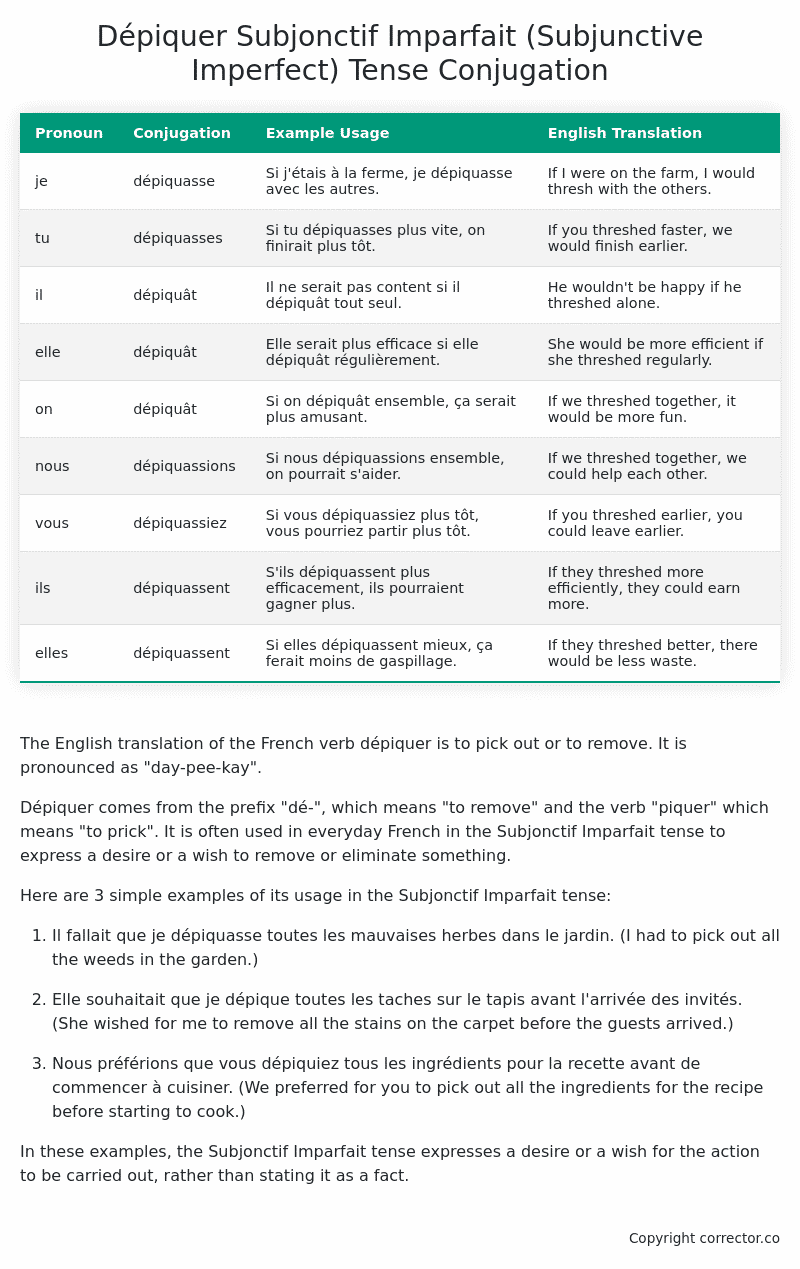Subjonctif Imparfait (Subjunctive Imperfect) Tense Conjugation of the French Verb dépiquer
Introduction to the verb dépiquer
The English translation of the French verb dépiquer is to pick out or to remove. It is pronounced as “day-pee-kay”.
Dépiquer comes from the prefix “dé-“, which means “to remove” and the verb “piquer” which means “to prick”. It is often used in everyday French in the Subjonctif Imparfait tense to express a desire or a wish to remove or eliminate something.
Here are 3 simple examples of its usage in the Subjonctif Imparfait tense:
-
Il fallait que je dépiquasse toutes les mauvaises herbes dans le jardin. (I had to pick out all the weeds in the garden.)
-
Elle souhaitait que je dépique toutes les taches sur le tapis avant l’arrivée des invités. (She wished for me to remove all the stains on the carpet before the guests arrived.)
-
Nous préférions que vous dépiquiez tous les ingrédients pour la recette avant de commencer à cuisiner. (We preferred for you to pick out all the ingredients for the recipe before starting to cook.)
In these examples, the Subjonctif Imparfait tense expresses a desire or a wish for the action to be carried out, rather than stating it as a fact.
Table of the Subjonctif Imparfait (Subjunctive Imperfect) Tense Conjugation of dépiquer
| Pronoun | Conjugation | Example Usage | English Translation |
|---|---|---|---|
| je | dépiquasse | Si j’étais à la ferme, je dépiquasse avec les autres. | If I were on the farm, I would thresh with the others. |
| tu | dépiquasses | Si tu dépiquasses plus vite, on finirait plus tôt. | If you threshed faster, we would finish earlier. |
| il | dépiquât | Il ne serait pas content si il dépiquât tout seul. | He wouldn’t be happy if he threshed alone. |
| elle | dépiquât | Elle serait plus efficace si elle dépiquât régulièrement. | She would be more efficient if she threshed regularly. |
| on | dépiquât | Si on dépiquât ensemble, ça serait plus amusant. | If we threshed together, it would be more fun. |
| nous | dépiquassions | Si nous dépiquassions ensemble, on pourrait s’aider. | If we threshed together, we could help each other. |
| vous | dépiquassiez | Si vous dépiquassiez plus tôt, vous pourriez partir plus tôt. | If you threshed earlier, you could leave earlier. |
| ils | dépiquassent | S’ils dépiquassent plus efficacement, ils pourraient gagner plus. | If they threshed more efficiently, they could earn more. |
| elles | dépiquassent | Si elles dépiquassent mieux, ça ferait moins de gaspillage. | If they threshed better, there would be less waste. |
Other Conjugations for Dépiquer.
Le Present (Present Tense) Conjugation of the French Verb dépiquer
Imparfait (Imperfect) Tense Conjugation of the French Verb dépiquer
Passé Simple (Simple Past) Tense Conjugation of the French Verb dépiquer
Passé Composé (Present Perfect) Tense Conjugation of the French Verb dépiquer
Futur Simple (Simple Future) Tense Conjugation of the French Verb dépiquer
Futur Proche (Near Future) Tense Conjugation of the French Verb dépiquer
Plus-que-parfait (Pluperfect) Tense Conjugation of the French Verb dépiquer
Passé Antérieur (Past Anterior) Tense Conjugation of the French Verb dépiquer
Futur Antérieur (Future Anterior) Tense Conjugation of the French Verb dépiquer
Subjonctif Présent (Subjunctive Present) Tense Conjugation of the French Verb dépiquer
Subjonctif Passé (Subjunctive Past) Tense Conjugation of the French Verb dépiquer
Subjonctif Imparfait (Subjunctive Imperfect) Tense Conjugation of the French Verb dépiquer (this article)
Subjonctif Plus-que-parfait (Subjunctive Pluperfect) Tense Conjugation of the French Verb dépiquer
Conditionnel Présent (Conditional Present) Tense Conjugation of the French Verb dépiquer
Conditionnel Passé (Conditional Past) Tense Conjugation of the French Verb dépiquer
L’impératif Présent (Imperative Present) Tense Conjugation of the French Verb dépiquer
L’infinitif Présent (Infinitive Present) Tense Conjugation of the French Verb dépiquer
Struggling with French verbs or the language in general? Why not use our free French Grammar Checker – no registration required!
Get a FREE Download Study Sheet of this Conjugation 🔥
Simply right click the image below, click “save image” and get your free reference for the dépiquer Subjonctif Imparfait tense conjugation!

Dépiquer – About the French Subjonctif Imparfait (Subjunctive Imperfect) Tense
Formation
Common Everyday Usage Patterns
Interactions with Other Tenses
Subjonctif Présent
Indicatif Passé Composé
Conditional
Conditional Perfect
Summary
I hope you enjoyed this article on the verb dépiquer. Still in a learning mood? Check out another TOTALLY random French verb conjugation!


